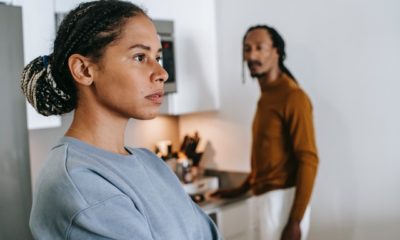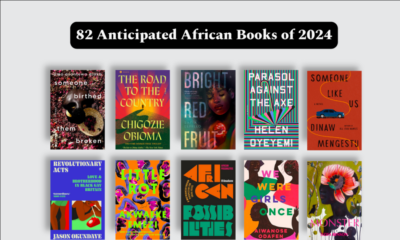Features
BN Prose: Your Lover by Chukwuebuka Ibeh
 We were there when you found him. Somehow, we had known beforehand. We had guessed from your face, the bashing smiles you gave, the sudden flushes of relevance, your high pitched laughter. And yet when you finally gave in to our curious stares and told us you had found the right one, we pretended to be surprised. You showed us pictures of him and we drooled over one of them that had him in suit, hands sunk into his trouser pockets, his gracefulness evident in his calm poise.
We were there when you found him. Somehow, we had known beforehand. We had guessed from your face, the bashing smiles you gave, the sudden flushes of relevance, your high pitched laughter. And yet when you finally gave in to our curious stares and told us you had found the right one, we pretended to be surprised. You showed us pictures of him and we drooled over one of them that had him in suit, hands sunk into his trouser pockets, his gracefulness evident in his calm poise.
You met him a week ago, at the bank along Olu Obasanjo road. The stupid staff at the bank had been unhelpful and unwilling to explain why you received alert debiting your account for a withdrawal you did not make. You angrily demanded to speak with the manager; and when he appeared, smooth-voiced and bespectacled, you suddenly wished you had listened to that voice that suggested you apply a little make-up before leaving the house. He was profusely apologetic. It was slight mistake, he said, one that would be corrected right away. His staff was rude to you? That would be looked into later. He went on to explain how some of these ‘technicalities’ happened, but you barely heard a word of what he was saying because suddenly, you wanted to breathe through his lungs. Later, when he slipped his card into your sweaty palms and told you to please give him a call, you felt something come undone within you and you were buoyed with the ridiculous urge to burst into laughter, because life itself was sometimes an interesting comedy, how masterfully it strung together pieces of coincidences to form a remarkable whole.
We were happy for you. Your last break up had been particularly hurtful. He was stupid and callous, that boy Tolu. He had dated you all this while since our university days, even introduced you to his friends as his fiancée. He had engaged you all the times you talked about your wedding, the colors you would like and the comedians that would most likely MC the occasion, and yet when it was time to get married, he suddenly remembered his parents would not like the idea of a girl from a different tribe as a daughter-in-law. It wasn’t that he did not love you, you see, but he had to think about his parents. We had vilified him, called him good-for-nothing; reminded you that he wasn’t good looking anyway. Foolish, poverty stricken Tolu with his big head who wasn’t even grateful you were kind enough to look at him.
And so we were particularly relieved when you told us this new one was from Aguata and had a house in Onitsha, at least no silly tales of parents not wanting an Igbo girl. You told us his name, Howard, and we coined it into something lyrical, merging the first syllables of his name with the last syllables of yours and you laughed at our teasing, throwing your legs in the air and covering your face with your hands. We felt mollified. You deserved happiness, we thought, and whoever made you this light had to be good. When do we get to meet him, we wondered. Soon, very soon, you said.
After we met him, we told you he was a good fit. We had indeed been charmed by him that day, how he opened doors for you and for us, how he spoke softly and slowly, his eyes on your face even when he was replying to a question one of us had asked, with the translucent gaze of a man who loved deeply and who wanted the world to know how much he loved. He was knowing, that man of yours, well versed without coming off as patronizing. He talked about fashion with Nkemakolam, focusing on the financial gain of it, telling us how fast rising the trend now was and how it was set to be a major contributor to Nigeria’s GDP if only more people would invest in the abundant budding creative designers littered about.
He talked about how his bank was set to partner with several new creative designing firms, and when he offered to include Nkemakolam in the list of possible partners, she smiled her gratitude and told him, in a flirty tone we frowned at, that he was such a darling. When Kadibia introduced herself as a writer and a columnist with The Guardian Nigeria, his eyes lit up with interest and he told us he had worked as a student journalist with a campus magazine back then in the university. He still wrote occasionally, boring stuff he was certain nobody wasted their time in reading. You chuckled then and placed your hand on the back of his palm and you told him oh please, of course he was such a fantastic writer. You loved all the things he had written, you said, and he told you, squeezing your hand gently, that that was because you were the absolute love of his life. The brief silence that followed was suffused with tenderness, and then both of you were locked in a passionate kiss. We had stolen surreptitious glances at the both of you and ourselves and we had been convinced that you really had found ‘the right one’.
We were happy for you. We told ourselves this often because somehow, it did matter. Even though we were irritated with how often you brought him up in conversations that was not even remotely connected to him. Even though we thought you loved him a bit too much and this love seemed to have cut out a slice of something familiar, something original, even though we worried that you spent too much time with him and less and less time with us, and we found it odd that you sprang to life at his life, animated at the mention of his name, and canceled pre-scheduled appointments just with a call from his end. Even though we stared at you often, holding out breaths most times as though waiting for something fragile and breakable to come crashing down, we told ourselves that you had longed for this happiness and you deserved in and it was finally here to stay, and we were happy for you.
We were there when you had your first fight. On one of those evenings you spent in his flat in GRA. You came home agitated and teary eyed and said you were done with that egocentric idiot. We held your hand and agreed with you that he was a big fool. He had no right to police your movements up and down Port Harcourt. Who the hell did he think he was? Bank Manager, our asses. Good thing you decided to leave him, the animal. You would find a better person; he was unworthy of you anyway. And yet when you told us two days later that he had apologized for his rash behavior and was willing to change, we smiled and said of course. He was a good man, really, and you both were perfect for each other. We nodded in agreement when you said men were like that, they sometimes got angry and said things they didn’t mean. In retrospect, we often wonder if it was us. All those times we led you on and laughed along and filled you with details of what you wanted to hear and not what we really thought, all the while assuring ourselves that we were looking out for your happiness. Was it us? Would things have turned out differently if only we had been true?
We were then when you had your first abortion, only a few months after you met him. We provided suggestions and opted for the best gynecologist in Port Harcourt and we held our peace during the short drive to a private clinic uptown, resisting the urge to tell you in plain words what we really thought of this arrangement. It was absurd, we longed to say, that a man who had engaged you only a few weeks ago was asking you to abort a pregnancy you had with him. We wanted to tell you that your explanation last night about him not being ready to father a child yet and the pregnancy not being good for his career and would be difficult for his conservative family to handle made absolutely no sense. But we knew saying this would hurt you, make you look stupid and irresponsible, make you feel small and lonely and betrayed by us, so we talked instead about the professionalism of the doctors there, pointing out one or two cases they had handled in the past and we squeezed your nervous palms and told you to stop worrying, it would go on smoothly.
When you came home with bruises again, Kadibia raised her palms to cut off your excuses. He bawled you fist after fist that morning until you could hardly feel your own skin again, you later confessed. We were angry with him and with you. He was a bastard and he deserved to be put in jail and had the key thrown away, and you needed caning as well to reset your brain. You sat on the floor while we unleashed our venom on you and him until we were exhausted and we cradled you gently and told you we were sorry. Don’t worry; we would always be here for you. When you told us the next morning that you were going to have a second abortion, we stared at you, speechless.
The drive remains etched on our memory to this day. It rained heavily that day and the windscreen of the car was so blurred that Nkemakolam had to drive slowly even though the roads were free. We handed you tissues after tissues during the drive and rocked your shoulders gently and told you it would be alright, you would be fine, while you cried over and over again, saying, in between sobs, that you could not believe this was happening to you. How could he blame you for getting pregnant? How could he say all those horrible things to you without the slightest emotion? What was he expecting when he solidly refused to use a condom? Had you not warned repeatedly that pulling out at the peak of his ecstasy was very unsafe? How could he accuse you of fucking half of the men in Port Harcourt and opting to dump an unplanned pregnancy on him? We kept our gaze fixed on the low hanging trees on the walkways of the streets in GRA and we forced ourselves not to think of the look on the face of the doctor at the hospital when he saw that you were the same patient he had handled only a few months ago. We chose not to think of the bastard and all the terrible things we would do to him later on. Deep down, we heaved a collective sigh of resignation, relieved that this madness of a relationship would finally come to an end after all.
And so imagine our surprise when you showed us recent pictures of you taken in his house and told us you were back together. He was sorry, you said. God, he had gone on his knees outside the salon in Rumuigbo and he had cried at your feet. He asked you to marry him, you said, dangling your finger for us to see. What better way could there possibly be to ask for an apology? We stared at you for a while, wondering when you suddenly became this idiotic, thinking about all those Facebook feminists’ posts you dished out often, all those fictious tales of leaving a relationship following emotional abuse, jailing a man because he had once slapped you. We longed to call you out on your hypocrisy, but when we finally spoke, it was with the words you wanted to hear. Thank God he was repentant now. Had a date been set for the wedding? Weren’t you such a lucky bitch though, we asked, laughing. Fancy a man falling to his knees in public to ask for forgiveness and apologize for ‘misconduct’. Didn’t you take pictures? Oh you fool!
When you found out about his wife and four children, we were there. You walked in that evening, calm and collected and you told us –your jaw set firmly, expression impassive- that he had a wife. They lived in Owerri. We were surprised. Somehow, we knew. We had always known. The signs had always been there; like that time when we drove by the boutique around Choba. Nkemakolam pointed at the car parked in the driveway and said wasn’t that Howard’s car? You had told us the day before that he had gone to Lagos on a business summit and would not be back until next week. You peered at the car closely and said it did look like it but Howard was not in town, and he wasn’t the only one with that kind of car for goodness sake. Nkemakolam had driven off then, and in the stilted silence that ensued, we did not tell you how preposterous we thought the assumption that there were two people with a black Honda of that model, carrying that bank sticker on the screen and that funny-looking stuffed doll dangling from the mirror above. It was there when he never allowed you to take selfies with him or tag him on Facebook, claiming he was horrible in selfies even though you couldn’t reconcile the word horrible with the angular features of his face. It was there that day when Nkemakolam came from the meeting with him and asked you if you were married to him already without our knowledge because she had seen a ring on his finger. Nkemakolam lost the bid to secure a partnership that day. When you asked him why, he gave you a dark look and said nothing.
And on the day you told us he had a wife, we sat still unmoved. There was something remote about your calm and it held us back from gushing and consoling you. You took a bath and told us you’d be back and we watched you leave the house, realizing at that moment, with sadness, that you would never need us again. When you came home that night, heavily drunk and staggering, we helped you to bed and lay still while you cried all night and talked about killing yourself. Not one of us raised our voice to console or caution you.
When you took those pills that ended your life forever, we weren’t there. We came home to find you hunched over the dining table, your eyes closed, a glass of sparkling water elegantly standing next to the tablets. We thought how odd it was that you would choose to fall asleep on the dining table of all places. Kadibia was the first to scream, medical student that she was, she only had to take one look at the tablet and realization dawned on her. The rest of the evening was a blur and even now, we cannot recall what exactly followed thereafter, we only know Howard had been arrested after Nkemakolam named him a potential suspect leading to your death, only to be released on bail two days after; we only know that your mother had gripped us so hard it hurt, when she asked us in Igbo, ‘What have you people done to my daughter?’
Your sister scolded her, saying it was unfair to blame us for your death when the doctors had said specifically that you had died because of the pills you took, and we were grateful for this, this intervention on our behalf, but as we drove back home that day, quiet, carrying but not sharing a mutual grief, we thought of your mother’s teary questions and we wondered if we had not somehow ‘done’ this to you.
We are here now, in a bar along Iwofe Road. This is what we do often nowadays, sit in dimly lit bars and order mild alcohol and recount fond memories of you. We talk about those days in junior secondary school when all the junior boys wanted to talk to you in particular. You, the only one considered worthy enough to be asked out by the senior boys, charming enough to humble the brashest boy in class. We speak of you in warm anecdotes, telling ourselves that you were one of the best things to happen to humankind. We state only your good qualities in our discussions, saying over and over again how kind you were, how friendly, how beautiful, as if we do not all know this. We individually recount how we met you, ending the stories with how very much we love you still and miss you. Sometimes we tell ourselves that we say these things because we really do love you and really do miss you so much now that you were gone. And sometimes we wonder if we say these things because by doing so, we somehow manage to convince ourselves that we had not indirectly led our own friend to her demise.
Photo Credit: © Ian Allenden | Dreamstime























